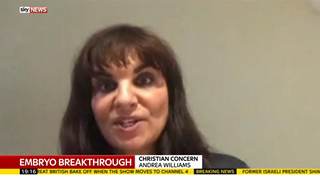Motherless babies a possibility scientists suggest

Motherless babies created from skin cells rather than eggs could become a reality, scientists have suggested.
On Tuesday, a team of scientists at the University of Bath announced that they have successfully created healthy baby mice by tricking sperm into believing they were fertilising normal eggs.
The findings, published in Nature Communications, mean babies could be created from the DNA of two men, in the distant future.
'Speculative and fanciful'
Dr Anthony Perry, a senior author of the study, said that the finding "challenges the dogma that only an egg cell fertilised with a sperm cell can result in live mammalian birth".
However, he added that the prospect of motherless children is currently "entirely speculative and fanciful".
Dr Paul Colville-Nash, from the Medical Research Council, which funded the study, said: "This is an exciting piece of research which may help us to understand more about how human life begins and what controls the viability of embryos, mechanisms which may be important in fertility.
"It may one day even have implications for how we treat infertility, though that's probably still a long way off."
The experiment
In the experiment Dr Perry’s team of scientists started with cells derived from unfertilised eggs. The cells were then injected with sperm, transforming them into pseudo-embryos.
These ‘fake’ embryos then underwent a process known as "distinctive chromatin remodelling," after which they shared much in common with ordinary cells, such as the way they divide and control their DNA.
In all, 30 baby mice were born with a success rate of 24 per cent. This compares with a less than 2 per cent success rate for offspring created by the ‘Dolly the Sheep’ method of cloning by transferring DNA to donated eggs.
Although the embryos in the experiment started out as egg cells, researchers have reasoned that it may one day be possible to achieve the same results with adult human cells that are not from eggs.
Dr Perry, a molecular embryologist, has announced that his team intends on taking this next step, of attempting to produce live offspring from ordinary non-egg cells, such as skin cells.
He told BBC News: "This is the first time that anyone has been able to show that anything other than an egg can combine with a sperm in this way to give rise to offspring.
"It overturns nearly 200 years of thinking."
'Unlikely'
Writing for the New Scientist, Andy Coghlan explains some of the science behind the findings and how it is unlikely to bring us any closer to making babies with two biological fathers.
He says of the research: "It's unlikely to pave the way to embryos with two fathers any time soon, but the experiment has told us something particularly interesting: there is more than one path to a healthy embryo."
Playing around with the face of the human race
Christian Concern’s Chief Executive, Andrea Williams, spoke to Sky News, on Tuesday evening, to say "scientists aren't respecting the dignity of human life".
Adding to her Sky News appearance, Andrea said:
"The real issue at stake here, is not technical but moral and ethical."
"These scientists are playing around with the face of the human race and undermining the pattern for family and human dignity that God has given to us. God’s good pattern for family is designed to be a lifelong union between one man and one woman, with children, where possible fitting under that union".
The 'New Normal'
Dr Robert Lopez, an English professor at California State University, who was raised by his mother and lesbian father, agrees.
In 2012 Robert wrote an essay in online journal The Public Discourse on his upbringing, stating that it had been harmful to him.
He believes that marriage should be between a man and a woman, and that children should be raised by a mother and father.
Robert will be speaking at The 'New Normal' conference in London, on Saturday 12 November, which aims to tackle today's problems of sexuality and gender in children.
Related Links:
Sky News report on the possibility of motherless babies conceived from skins cells
Mice produced by mitotic reprogramming of sperm injected into haploid parthenogenotes (Nature)
Here’s why "two-dad" babies aren’t yet a biological reality (New Scientist)
Babies may be made with skin, not eggs (Times £)
Event: The 'New Normal' (EventBrite)
